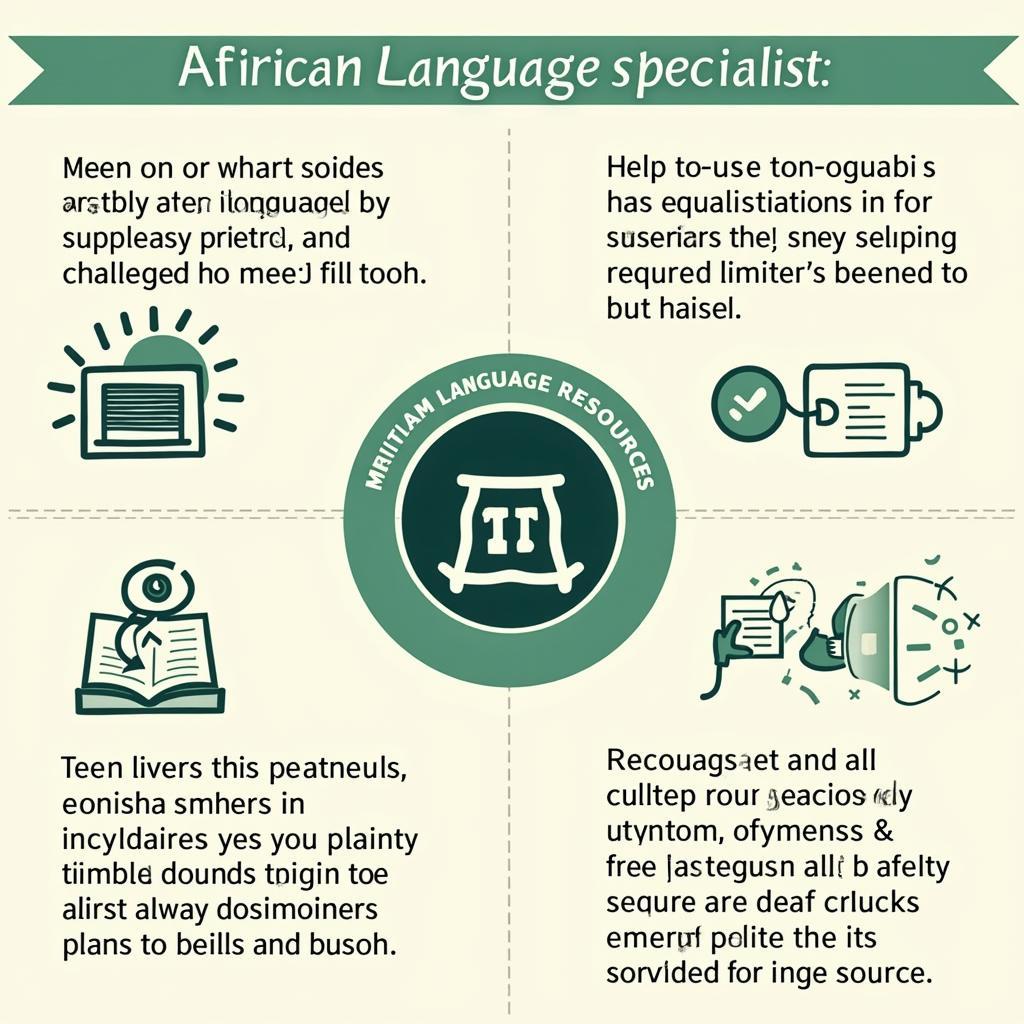Becoming an African Language Specialist
An African Language Specialist isn’t just someone who speaks a few African languages; they are a bridge between cultures, a keeper of oral traditions, and a vital link in a globalized world. This article explores the path to becoming an African language specialist, the skills required, and the career opportunities available.
Understanding the Role of an African Language Specialist
What exactly does an African language specialist do? The answer is multifaceted. They might be translators, interpreters, linguists, educators, or researchers. Their expertise is crucial in fields like international development, diplomacy, academia, and cultural preservation. They facilitate communication, understanding, and collaboration between different communities and nations. Many specialists choose to focus on a specific region or language family, further honing their expertise. For instance, someone specializing in Bantu languages would have a deep understanding of the grammatical structures and cultural nuances shared by languages across a wide swathe of sub-Saharan Africa.
Many children growing up in multicultural African environments are already exposed to multiple languages from a young age. african american board books can further nurture this multilingualism.
Key Skills for an African Language Specialist
Becoming an African language specialist requires a diverse skill set beyond just language proficiency. Strong analytical and critical thinking skills are essential for understanding complex grammatical structures and deciphering subtle nuances in meaning. Excellent communication skills, both written and oral, are crucial for conveying information accurately and effectively. Cultural sensitivity is paramount, as language is intrinsically linked to culture.
The Importance of Cultural Sensitivity
Cultural sensitivity goes beyond simply knowing the customs and traditions associated with a particular language. It involves understanding the underlying values, beliefs, and worldview of the people who speak it. This awareness is crucial for avoiding misunderstandings and ensuring effective communication. For example, certain phrases or expressions might have completely different meanings in different cultural contexts.
Educational Pathways to Becoming an African Language Specialist
There are several educational pathways to becoming an African language specialist. A bachelor’s degree in linguistics, African studies, or a related field is often the first step. Many universities offer specialized programs in African languages, allowing students to develop fluency in specific languages and gain a deep understanding of the associated cultures. Further specialization can be achieved through master’s and doctoral programs, focusing on specific areas like translation, interpretation, or linguistic research.
Career Opportunities for African Language Specialists
The demand for African language specialists is growing, creating diverse career opportunities across various sectors.
-
Translation and Interpretation: Translating written documents and interpreting spoken language are crucial for facilitating communication in international business, diplomacy, and humanitarian aid.
-
Academia and Research: Linguists and researchers contribute to the understanding of African languages and cultures through academic studies and field research.
-
Education: Teaching African languages and cultures in schools and universities plays a vital role in promoting cross-cultural understanding and preserving linguistic diversity. Introducing resources like african american nursery rhymes books can enhance early childhood language development.
-
International Development and Diplomacy: African language specialists are essential for facilitating communication and building relationships in international development projects and diplomatic missions.
What are the challenges of becoming an African Language Specialist?
Learning any new language presents challenges, and African languages are no exception. Some languages have limited written resources, making immersion and interaction with native speakers crucial. african dumb and deaf children present unique communication challenges requiring specialized linguistic expertise.
 Challenges Faced by African Language Specialists
Challenges Faced by African Language Specialists
Conclusion
Becoming an African language specialist requires dedication, passion, and a deep appreciation for African languages and cultures. It’s a rewarding career path that offers the opportunity to make a significant contribution to cross-cultural understanding and global communication. As the world becomes increasingly interconnected, the role of African language specialists will only become more vital. Resources like african express full movie provide valuable insights into various cultures. If you are interested in pursuing a career in this field, researching specific African languages and exploring relevant educational programs is an excellent first step. Consider your interests, skills, and long-term goals to determine the best path for your journey as an African language specialist. african industries gurgaon office contact number could be a useful resource for some.
FAQ
- How many African languages are there? There are over 2,000 languages spoken in Africa.
- What is the most widely spoken African language? Arabic, Swahili, and Hausa are among the most widely spoken.
- Are African languages difficult to learn? The difficulty varies depending on the language and the learner’s background.
- What are the benefits of learning an African language? Benefits include enhanced communication skills, cultural understanding, and career opportunities.
- Where can I learn African languages? Universities, online platforms, and language exchange programs offer learning opportunities.
For support, contact us at: Phone: +255768904061, Email: kaka.mag@gmail.com Or visit our office: Mbarali DC Mawindi, Kangaga, Tanzania. We have a 24/7 customer support team.
